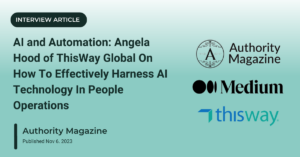Once upon a time, people went to work.
They rose early. Depending on their commute, or upon whatever wee hours of the morning their employers got things started, some would even beat the dawn’s early light by a long shot, rising as early as three or four a.m. (unless they worked a night shift).
They got into their cars and drove away… and sat in traffic. They clambered aboard buses and headed for the office. And sat in traffic. They scrambled aboard crowded trains, and while they didn’t have to sit in traffic, they were forced to endure long, dull rides with many stops.
Rides made even duller by the lack of any human interaction since, after all, attempting to engage a fellow commuter in conversation was a serious faux pas.
For millions of people, for better or worse, that’s all changed.
No crystal ball here, but let’s look at the future anyway.
That Was Then. This Is Now.
According to Gallup, as of September 2019, 43% of U.S. employees worked remotely at least some of the time. But as of May 2020, the number of workers who “always” or “sometimes” worked from home was at 68%.
The current climate has forced many in the C-suite to examine and reevaluate their belief systems. Many labored under the misperception that remote work always meant a huge dip in productivity. Others feared that managing teams that were now physically separated would be next to impossible.
And then, there are always the micromanagers, who detest remote work no matter the circumstances or advances in technology. One of my family members is laboring under one such manager. Frustrated at being forced to work at home and manage a remotely working team as well (a team of experts who need far less “managing” than this boss seems to think), has been making up for this “lack” by becoming nothing short of a nuisance. At least one employee has quit, and others are murmuring things along the same lines.
Perhaps not coincidentally, within two months of their employees working from home, this same small company announced that they would be ordering everyone back to the office as soon as they were able. Never mind the fact that their sales numbers have skyrocketed.
Despite evidence to the contrary, there will always be a few folks married to the “that’s the way we’ve always done it” mentality (even to their detriment). However, it seems that a significant enough number of employers have forged ahead into this new territory to change the future landscape of remote work. Increased reliability in technology (like video conferencing) and a recognition of savings through eliminating office space are major factors in this change.
Some companies have announced that even once the COVID crisis is over, they will continue to allow their employees to work from home – among them are Zillow, Coinbase, Google, Square, Facebook, Twitter, and Shopify, to name a few.
Remote Work Pros and Cons… and Jokes?
Of course, as with virtually anything else in life, there are pros and cons of remote work. The extrovert may feel lonely and isolated; the introvert may feel… well, right at home. Others wouldn’t mind working from home, but they have issues at home that may prevent them from focusing and being productive.
Not having a quiet space to work, free from interruptions, or having relationship problems with other family members, or trying to work with kids underfoot are all productivity-killers, even for the introvert who would love to work at home.
On the other hand, working in an office can be just as distracting for some workers, depending on the type of work and the office environment. Noisy coworkers, office politics and bullying come to mind, but there could also be what I would call “positive distractions” as well.
For example, years ago I was working a data entry job in a normally quiet office. Except in my small area of five team members, two of my coworkers were good friends who happened to be uproariously funny. We’re talking side-splitting, ROFL, hilariously funny to the point where my abdominal muscles would hurt the next day, type of funny.
Much as I loved them, it was exceedingly difficult to get anything done with those two around. Eventually, they moved on, and my productivity went up. Funny how that works.
The New Era
All joking aside, what many managers are learning in these trying times – besides the fact that remote work is here to stay – is that they can effectively manage their teams from afar… no micromanaging needed. Not to say it doesn’t require effort by both the team member and the manager. By taking the time to get to know the individuals on their teams, their personalities and ways of communicating, a good manager can elicit the best from each player.
And believe it or not, despite the pandemic and the unique challenges it brings, it is now a good time to hunt for a job. Why is that? For one thing, a silver lining to this crisis is that it has opened up more opportunities, especially in certain sectors. Another plus is, it’s so much easier to job-hunt from home.
We’ll get into that in Part II, so stay tuned!









